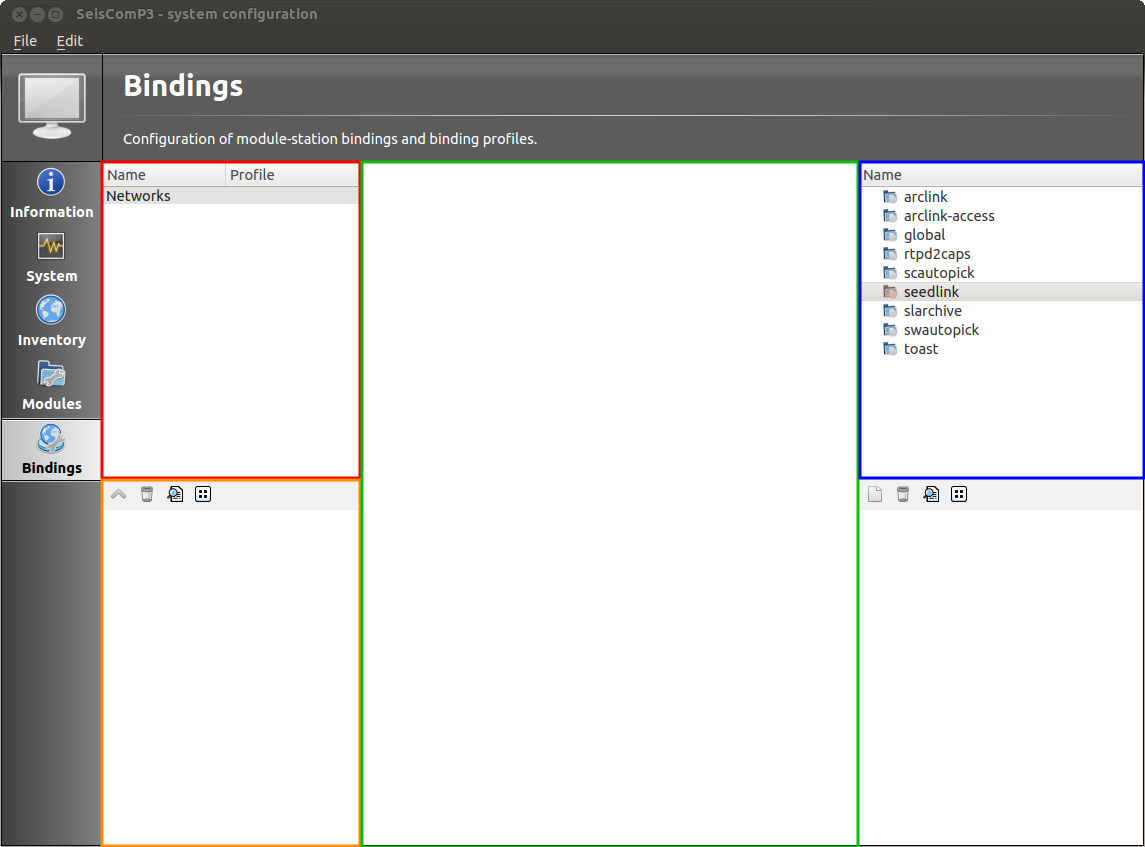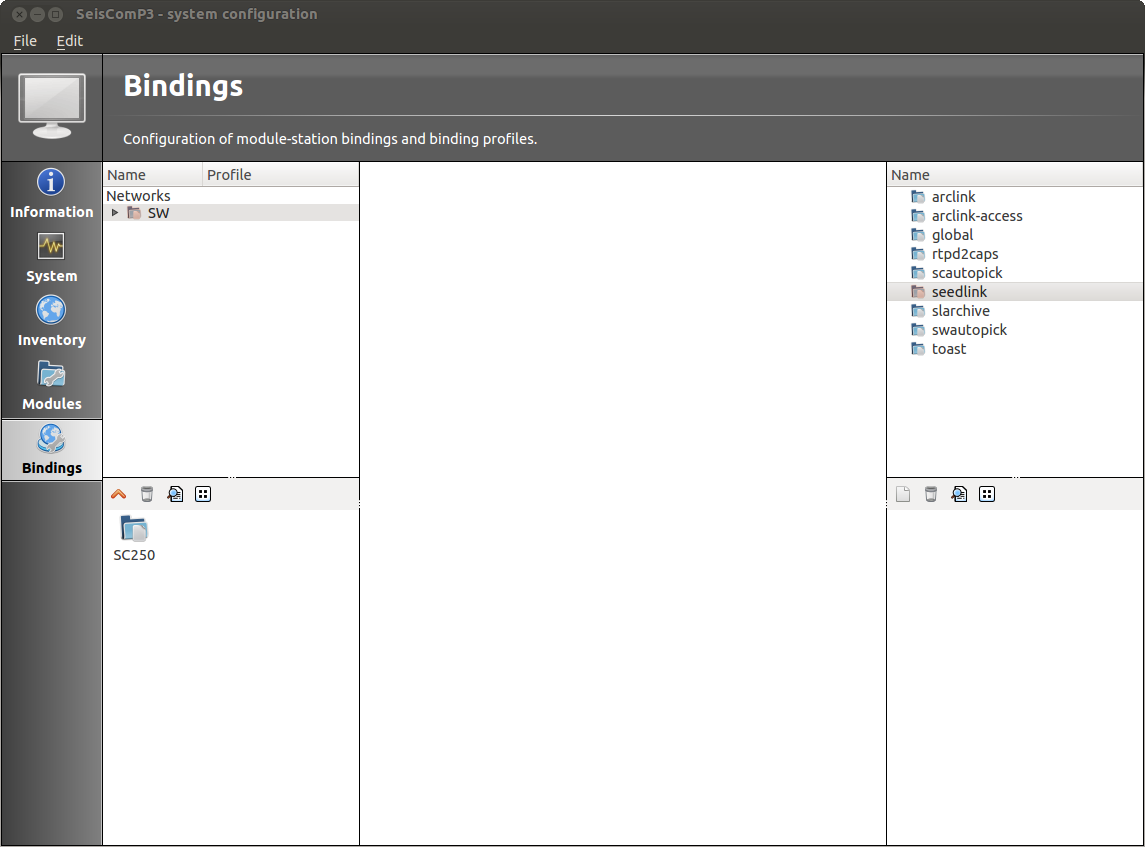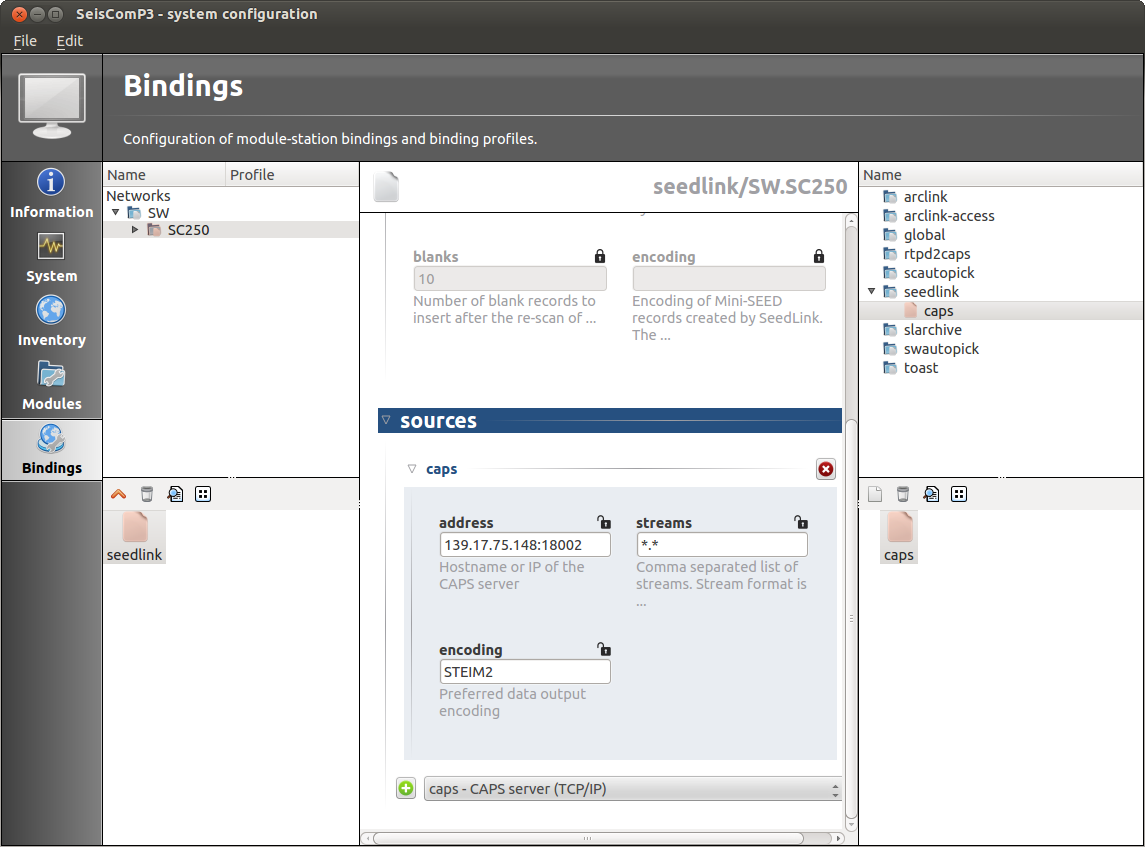caps_plugin¶
Transfers data from CAPS to SeedLink server
Description¶
CAPS! server plugin that receives raw data via the CAPS! protocol and sends raw or compressed data to Seedlink or to standard out.
Configuration¶
The caps_plugin can be configured as any other Seedlink plugins, e.g. via scconfig. The configuration is shown using the SC250 station of the SW network as an example. To start scconfig run:
> seiscomp exec scconfig
Select ‘Bindings’ from the panel switch. The bindings panel shown in figure Bindings panel configures a station for a module. It is separated into three main areas:
the station tree (red + orange)
the binding content (green)
the module tree (blue)

Bindings panel¶
Open the context menu of the view below the station tree and select ‘Add network’ to add a new network. Fill in the network name ‘SW’ into the input form and press ‘OK’. A double click on the network ‘SW’ shows the associated stations. Add a new Station ‘SC250’ in the same way as done before for the network. Figure Figure Station tree of the SW network shows the current station tree.

Station tree of the SW network¶
To complete the configuration open the station ‘SC250’ in the station tree and use the context menu to add a new binding for Seedlink. Go to the sources section of the binding content, select ‘CAPS’ and press the button on left side of the selection box. Leave the upcoming input form blank and press ‘OK’. Subsequently click on the triangle besides the CAPS label and set up the caps_plugin. Supported encodings are ‘STEIM1’ and ‘STEIM2’. Use an empty encoding string to create raw miniSEED packets. Figure CAPS Binding configuration shows an example configuration.

CAPS Binding configuration¶
Press ‘CTRL+S’ to save all changes. Afterwards switch to the ‘System panel’, select Seedlink in the module list and press ‘Update configuration’.
Examples¶
The caps plugin can also be used as a command-line tool to request data. The data will be sent to standard out.
Command-line help¶
> seiscomp exec bash
> $SEISCOMP_ROOT/share/plugins/seedlink/caps_plugin -h
Data file request¶
Submit the request to the CAPS server to download miniSEED data to a file, e.g. data.mseed:
seiscomp exec bash
> $SEISCOMP_ROOT/share/plugins/seedlink/caps_plugin -I localhost:18002 -A SW.SC250..HH? \
--encoding STEIM2 caps2sl.localhost.18002.state \
--begin "2013-08-01 00:00:00" --end "2013-08-01 01:00:00" \
--dump > data.mseed
Submit the request based on the request file to the CAPS server to ownload miniSEED data to a file, e.g. data.mseed:
seiscomp exec bash
> $SEISCOMP_ROOT/share/plugins/seedlink/caps_plugin -I localhost:18002 -f streams_list \
--encoding STEIM2 caps2sl.localhost.18002.state \
--begin "2013-08-01 00:00:00" --end "2013-08-01 01:00:00" \
--dump > data.mseed
Request file, e.g. streams_list:
SW.SC254..*
SW.SC250..HH?
SW.*..HHZ
Module Configuration¶
etc/defaults/global.cfgetc/defaults/caps_plugin.cfgetc/global.cfgetc/caps_plugin.cfg~/.seiscomp/global.cfg~/.seiscomp/caps_plugin.cfgcaps_plugin inherits global options.
Note
Modules/plugins may require a license file. The default path to license
files is @DATADIR@/licenses/ which can be overridden by global
configuration of the parameter gempa.licensePath. Example:
gempa.licensePath = @CONFIGDIR@/licenses
- journal¶
Type: string
File to store stream states. Use an empty string to log to standard out.
- archive¶
Default:
falseType: boolean
Disables realtime mode. Only archived data is fetched.
- input.address¶
Default:
localhost:18002Type: string
CAPS URL to fetch data from, format: [[caps|capss]://][user:pass@]host[:port]
Command-Line Options¶
Generic¶
- -h, --help¶
Show help message.
- -V, --version¶
Show version information.
- --config-file file¶
The alternative module configuration file. When this option is used, the module configuration is only read from the given file and no other configuration stage is considered. Therefore, all configuration including the definition of plugins must be contained in that file or given along with other command-line options such as --plugins.
- --plugins arg¶
Load given plugins.
- -D, --daemon¶
Run as daemon. This means the application will fork itself and doesn’t need to be started with &.
Verbosity¶
- --verbosity arg¶
Verbosity level [0..4]. 0:quiet, 1:error, 2:warning, 3:info, 4:debug.
- -v, --v¶
Increase verbosity level (may be repeated, e.g., -vv).
- -q, --quiet¶
Quiet mode: no logging output.
- --print-component arg¶
For each log entry print the component right after the log level. By default the component output is enabled for file output but disabled for console output.
- --component arg¶
Limit the logging to a certain component. This option can be given more than once.
- -s, --syslog¶
Use syslog logging backend. The output usually goes to /var/lib/messages.
- -l, --lockfile arg¶
Path to lock file.
- --console arg¶
Send log output to stdout.
- --debug¶
Execute in debug mode. Equivalent to --verbosity=4 --console=1 .
- --trace¶
Execute in trace mode. Equivalent to --verbosity=4 --console=1 --print-component=1 --print-context=1 .
- --log-file arg¶
Use alternative log file.
Plugin¶
- -I, --input arg¶
Overrides configuration parameter
input.address.
Streams¶
- -A, --add-stream arg¶
List of stream IDs [net.sta.loc.cha] to add, wildcards are supported
- -f, --stream-file arg¶
Path to stream-file. The stream file may contain a list of streams IDs [net.sta.loc.cha]
- --begin arg¶
Request start time
- --end arg¶
Request end time
Mode¶
Output¶
- --dump arg¶
Dump all received data to stdout and don’t push the data to SeedLink
- --encoding arg¶
Preferred data output encoding
- -I, --input arg¶
Data input host